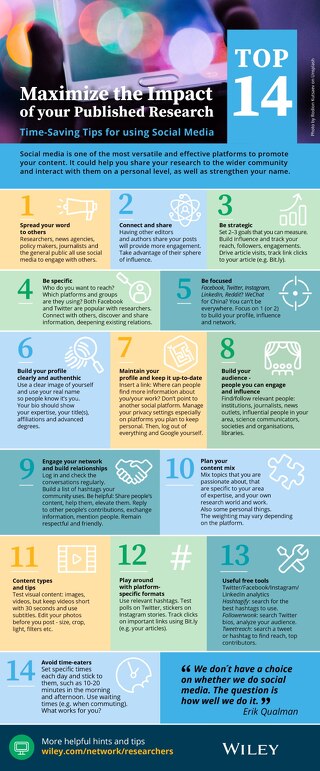how-to-promote-your-research-through-blogging
August 07, 2014
With around 42.6 million new posts each month on WordPress alone, blogging has become a serious marketing and business tool. But why should you, as a researcher and author, spend time creating and writing a blog?
After all, your time is precious, and setting up a blog, writing regular posts and gaining followers isn’t necessarily at the top of your radar. However, with more and more journals incorporating blogs as part of their online presence, and an increasing number of academics blogging regularly, here’s why you should too- and how to get the most from your efforts.
Why blog?
First of all, it will help you refine your writing skills. Blogs are more widely read than academic journals and textbooks, so while you could be writing for a broad audience, your posts will still need to hold up to academic scrutiny while being accessible.
Blogging is also a great aid to discoverability. Every time you write a blog post, you are creating content that can be shared via social media, as well as providing a cue to search engines that your website is active. Additionally, non-academics find it a lot easier to access a blog than to find their way around journals and paywalls, so your work has the potential to reach and influence a much wider audience. Not convinced? Over 409 million people view more than 14.4 billion WordPress pages every month- that’s a lot of potential readers!
With a blog, you immediately become part of a large network of bloggers with whom you can share thoughts and ideas, and engage in some of the cutting edge debates in your area of interest. Not only can this further enhance your reputation as an expert in your field, it’s a great opportunity to hone your communication skills as well as gain valuable feedback on ideas and broaden your professional network. For early career researchers, starting a blog can be beneficial as you network with more experienced academics and pick up tips on how to publish, or refine your CV for example.
With many institutions and research funders placing a growing emphasis on open access and community outreach, a blog can be a great way to reach out to the public and engage in meaningful conversation around your area of expertise. Blogging enables you to share your enthusiasm for your subject with those outside of the narrow world of academia, maybe even inspiring the next generation of researchers along the way.
How to write your blog and promote your work
Setting up a blog is incredibly easy with services such as WordPress, Blogger and Tumblr. Once you’ve chosen your domain name and a theme, you are pretty much ready to start posting. But what makes a good blog, and how do you go about promoting your work?
1. Find your voice
As you start to blog, you will end up finding your own voice and style of writing. Look at other academic blogs to see the range of styles used, and find what suits you best, whether that is shorter posts or longer, more reflective posts. Make it clear whether or not you are writing on behalf of an institution and, importantly, be yourself! Successful blogs tend to use a conversational tone and speak directly to the reader.
2. Define your audience
Make sure that you know who you are aiming your blog at- whether it be fellow academics and researchers, policy decision makers or even schoolchildren. When you write, you should always have this audience in mind. This will help develop your tone and style and your readers will end up feeling more ‘connected’ to your writing. Just remember to make your writing accessible to all- overly scientific and technical jargon will alienate some readers, as will posts that constantly stray off topic.
3. Use social media
Make use of your social media accounts to promote your latest blog post. A Facebook post or a Tweet will broaden the scope of your blog’s reach and let people know as soon as you’ve posted something new. And best of all, if you have your social media accounts linked, this will take minimal time and effort.
4. Read other blogs
But don’t just read them. Get involved by entering into conversations, posting comments and linking to posts that interest you on your own blog. This will encourage others to link to you and increase your online discoverability. When you comment on other blogs, try to add value by offering useful information and advice. This can be an excellent way of networking with fellow bloggers in your field of expertise.
5. Include keywords
You want your blog to be as visible as possible on search engines, especially Google, as this will generate a lot of the traffic to your site. Think of keywords that best sum up your post and repeat them throughout your text (just don’t overdo it!) and in the post title. The trick is to use words that you think people will search for when looking for the type of content you are posting.
6. Guest blog
Writing posts for other, more well-known blogs can be a good way to get your own blog going to begin with. Not only are you networking with other bloggers, you are creating a name for yourself, and your posts will include a link to your own blog. Having your blog linked to a more well-established blog is also great for search engine optimization.
Good luck on your blogging journey!













